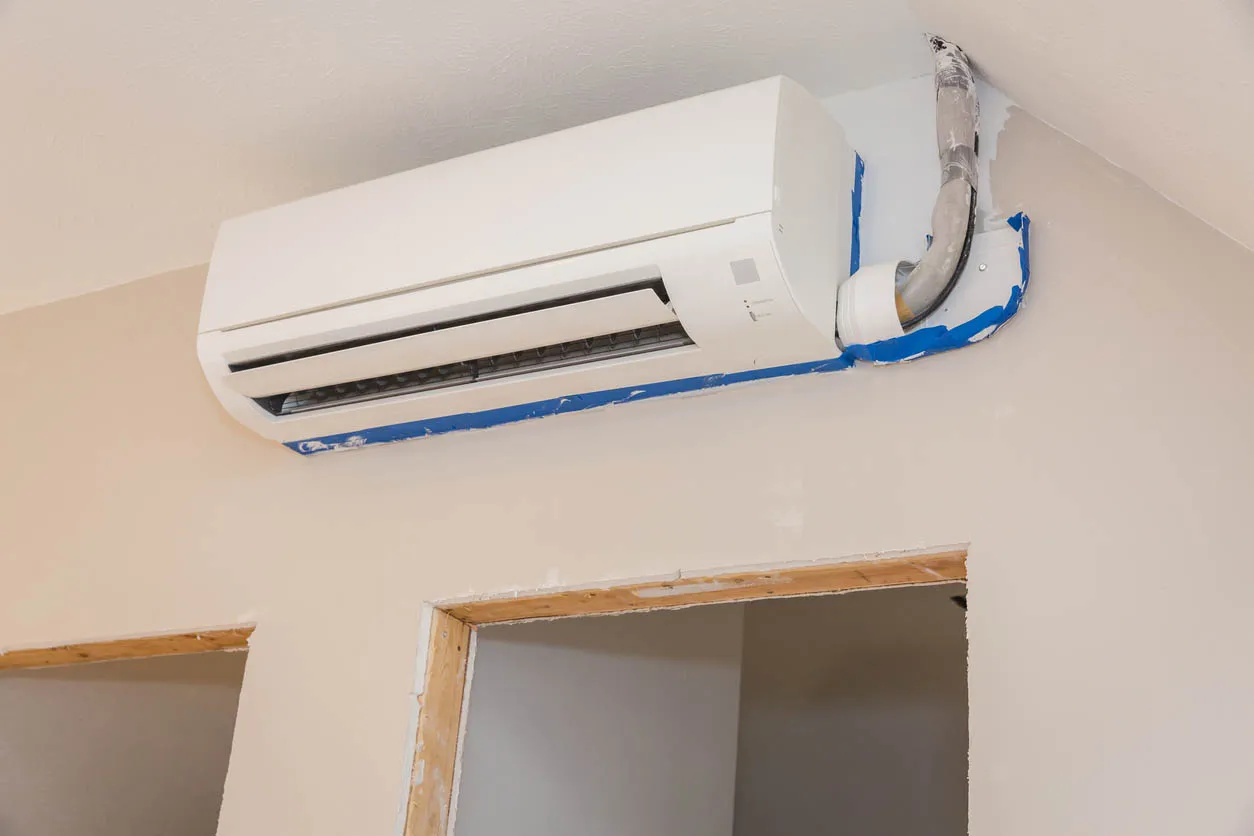Ductless Mini Split Maintenance in Chatsworth, CA
Serving Ventura & Sacramento Counties

Ductless Mini Split Maintenance Chatsworth, CA
Ductless mini split maintenance in Chatsworth, CA protects comfort, lowers energy costs, and prevents unexpected breakdowns in a climate that puts extra stress on HVAC equipment. With hot, dry summers, frequent dust from the Santa Susana foothills, and periodic wildfire smoke in the San Fernando Valley, mini splits in Chatsworth run hard and collect more airborne particles than systems in cleaner-air neighborhoods. Proper maintenance — from indoor unit cleaning to refrigerant checks and controller testing — keeps your system efficient, improves indoor air quality, and extends equipment life.
Common ductless mini split issues in Chatsworth
- Reduced cooling or heating capacity: Often caused by dirty filters, restricted airflow, or low refrigerant.
- Higher energy bills: Systems working harder because of clogged coils, dirty condensers, or poor airflow.
- Water leaks from indoor unit: Clogged condensate drain or damaged drain pan leads to leaks and possible mold growth.
- Frozen indoor coil: Caused by restricted airflow or refrigerant imbalance.
- Unusual noises: Rattles, grinding, or squeals from fan motors, loose mounting hardware, or failing compressors.
- Controller or communication failures: Remote, wall controller, or WiFi connectivity issues that prevent proper temperature control.
- Short cycling or frequent compressor starts: Electrical issues, incorrect settings, or refrigerant problems can shorten system lifespan.

What professional ductless mini split maintenance includes
A thorough maintenance visit inspects and services every component that affects performance and reliability. For Chatsworth homes, technicians typically perform the following tasks:
Indoor unit cleaning
- Remove and wash washable filters; replace disposable filters.
- Clean evaporator coil and blower wheel to restore airflow and heat transfer.
- Sanitize drain pan and flush condensate line to prevent clogs and microbial growth.
- Inspect and tighten wall-mount hardware and cabinet seals.
Filter servicing
- Check filter condition and recommend cleaning frequency based on dust levels and wildfire smoke exposure.
- Advise on upgraded filtration options when indoor air quality is a concern.
Outdoor condenser inspection
- Clear vegetation, dirt, and debris around the condenser; clean condenser coil and straighten bent fins.
- Inspect fan motor, blades, and mounting for wear or damage.
- Verify adequate clearance for airflow — critical in compact Chatsworth yards.
Refrigerant checks
- Measure refrigerant pressures and compare to manufacturer specifications.
- Perform leak detection when pressures or performance indicate a loss of refrigerant.
- Explain repair requirements: leaks must be located and repaired before a refrigerant recharge.
Controller and communication testing
- Test wall controllers, remotes, and WiFi modules for reliable operation and firmware responsiveness.
- Verify sensor accuracy and temperature settings, ensuring the unit cycles correctly and maintains setpoints.
Electrical and safety inspection
- Tighten electrical connections, check capacitors, contactors, and fuses.
- Measure motor and compressor amp draw to detect early motor stress.
- Confirm proper grounding and line-set insulation condition.
Performance verification
- Measure supply and return air temperatures and airflow to confirm the unit produces expected capacity.
- Run a full operational test in both cooling and heating modes when applicable.
Diagnostic process — what a technician checks and why it matters
A professional starts with a visual inspection, then runs the system and records performance data. Typical diagnostic steps:
- Review homeowner concerns and recent operating history.
- Inspect indoor and outdoor units for visible damage, debris, and drainage issues.
- Check filters, coil cleanliness, and blower movement to diagnose airflow restrictions.
- Attach gauges to measure refrigerant pressures and use leak detection tools if needed.
- Test electrical components and measure amp draw and voltages.
- Verify controller communications and perform an operational test to observe cycling and temperature control.
This systematic approach separates simple homeowner tasks (filter cleaning) from technical repairs (refrigerant leaks, electrical replacements) and identifies near-term risks before they become costly failures.
Common repairs and typical solutions
- Clogged condensate drain: Remove obstruction, flush line, and install an access for future service.
- Low refrigerant: Locate and repair leak, pressure test, and recharge to manufacturer spec.
- Failed fan or blower motor: Replace motor or bearings and rebalance blades to reduce noise and wear.
- Electrical failures: Replace capacitors, contactors, or worn wiring connections discovered during inspection.
- Controller or communication issues: Re-pair remotes, update firmware when applicable, or replace defective wall controllers or WiFi modules.
- Damaged line set insulation: Replace insulation to prevent energy loss and condensation problems.
Recommended maintenance intervals for Chatsworth homes
Homeowner tasks:
- Clean or inspect washable filters every 2 to 4 weeks during heavy use or high dust/smoke periods.
- Wipe down indoor unit louvers monthly and ensure nothing blocks indoor airflow.
Professional service:
- At minimum once per year for a full inspection and tune-up.
- Preferred every 6 months (pre-summer and pre-winter) for homes in Chatsworth due to high run times and dust exposure.
- More frequent professional checks (every 3 months) for properties near open land, construction, or with occupants sensitive to indoor air quality.
Regular service is often required to maintain manufacturer warranties and ensures systems operate safely and efficiently.
Benefits of regular ductless mini split maintenance in Chatsworth
- Improved energy efficiency and lower monthly utility costs.
- More consistent comfort during Chatsworth heat waves and cold snaps.
- Reduced risk of sudden failures and costly emergency repairs.
- Better indoor air quality by removing dust, particles, and biological growth.
- Extended system lifespan and preserved manufacturer warranties.
- Reliable controller and connectivity performance for modern smart systems.
Proper maintenance keeps your mini split running at peak performance despite the unique challenges of the San Fernando Valley environment. With routine filter care, seasonal professional inspections, and prompt attention to warning signs like leaks or reduced cooling, your ductless system will deliver efficient, comfortable air year-round in Chatsworth homes.
Clean, Reliable Performance Starts With Expert Mini Split Maintenance
When airborne dust, pollen, and wildfire smoke stress your system, professional ductless mini split maintenance in Chatsworth, CA, ensures lasting comfort and lower operating costs. Filter clogs, drain issues, and refrigerant imbalances are common in local homes—especially with extended usage and exposure to foothill debris. That’s why AirWorks Heating Air Plumbing delivers full-system care, from indoor coil cleaning to controller diagnostics, tailored to Chatsworth’s conditions. Regular maintenance improves air quality, reduces wear, and keeps your system efficient and responsive when you need it most.
Keep Your System Running Clean and Efficient With Mini Split Maintenance Built for Chatsworth Homes


